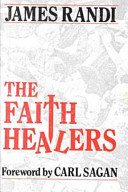Three Types of Faith
philosopher Paul Kurtz, in his book The Transcendental Temptation, defines three distinctly different kinds of faith, derived from the amount (or total lack) of evidence drawn upon to support it. Kurtz defines the first kind as “intransigent faith.” By this is meant faith that will not be affected by any sort of contrary evidence, no matter how strong. My own experience with some few persons who persist in believing in certain paranormal claims that have been conclusively proven false enables me to label their faith as Type I. A would-be parapsychologist in Wisconsin was one of those completely taken in by my Project Alpha, an experiment which sent two young student conjurers into a laboratory in St. Louis posing as psychics. They convinced the researchers there that they had “psychic” powers, as evidenced by the researchers’ communications with other scientists and by their lab reports and records. The intent of the Project Alpha experiment was to show that the researchers would have sufficient faith in their abilities to detect trickery and in the assumptions of their trade that they would not exercise either common sense or careful scrutiny in performing their tests. When the hoax was finally revealed, with full explanations from the two participants on exactly how they had performed their tricks, the Wisconsin amateur still insisted that they were genuine. He provides us with a perfect example of Type I faith. Gerry Straub, who spent two and a half years as evangelist/healer Pat Robertson’s television producer and wrote Salvation for Sale, to describe his experiences there, gave his opinion: I am convinced that if Pat Robertson or any other of television’s faith-healers were proven to be pranksters and frauds, the vast majority of their staff and viewers would not drop their belief in the ministers’ healing power or weaken their faith in God. Those people would be exhibiting Type I faith. Type II faith was called by philosopher William James “the will to believe.” As defined by Professor Kurtz it is “willful belief. . . where there is insufficient or no evidence either way to make a rational choice.” It really involves making a decision to believe, even though the reasons for doing so are not compelling. However, there may be reasons for believing that have nothing to do with the logic of the matter; it may be more comforting, more socially advantageous, or simply easier to choose to believe. One who goes along with a political party only because that party has always been the family party exhibits Type II faith. Were I to investigate claimed faith-healings for 60 years and fail to uncover one that meets the bare needs of rational acceptance, Type II believers would still choose to believe— even though they themselves had not been able to produce a single healing— just because I had not disproved the matter. Last, Type III faith is described as “hypotheses based upon evidence.” Here, there is evidence, but not enough evidence or evidence of good enough quality to support total belief. As I step off a curb to cross with a traffic light that has just turned green, I may safely assume that the light will stay green long enough for me to reach the other side. That assumption is based upon my long experience with traffic lights and the knowledge of the general intent of those who designed, manufactured, installed, and maintain the device. I have exhibited Type III faith. Science creates a hypothesis based upon observations, then sets out to examine the validity of that hypothesis. After enough observations have been gathered and the idea has been tested thoroughly with positive results, the hypothesis becomes a theory. The beauty of that theory is that it is subject to revision and/or retraction upon the presentation of contrary evidence. Thus scientists can be said to exhibit Type III faith.
Notes:
Type I is belief in what is proven false, type II is belief in what has no evidence, and type III is empirical scientifically-proven belief.
Folksonomies: faith empricism belief
Taxonomies:
/science (0.459548)
/technology and computing/computer security (0.443646)
/religion and spirituality (0.411632)
Keywords:
type (0.956001 (positive:0.210854)), Type III faith (0.909209 (positive:0.380086)), contrary evidence (0.896519 (negative:-0.380704)), philosopher Paul Kurtz (0.874933 (neutral:0.000000)), Project Alpha (0.855185 (negative:-0.402153)), young student conjurers (0.853952 (neutral:0.000000)), distinctly different kinds (0.852097 (neutral:0.000000)), certain paranormal claims (0.830797 (negative:-0.332291)), Type II faith (0.813200 (positive:0.430382)), Project Alpha experiment (0.806013 (negative:-0.472016)), evangelist/healer Pat Robertson (0.805097 (positive:0.335941)), philosopher William James (0.796455 (neutral:0.000000)), Faith Type (0.767079 (neutral:0.000000)), Type I. (0.721543 (negative:-0.332291)), sufficient faith (0.712883 (negative:-0.472016)), intransigent faith. (0.704711 (negative:-0.403028)), would-be parapsychologist (0.699809 (negative:-0.332291)), willful belief (0.699415 (negative:-0.563767)), Professor Kurtz (0.693058 (neutral:0.000000)), Transcendental Temptation (0.692579 (neutral:0.000000)), St. Louis (0.686220 (neutral:0.000000)), Type II believers (0.685561 (neutral:0.000000)), total lack (0.684841 (negative:-0.354727)), careful scrutiny (0.682701 (negative:-0.472016)), total belief (0.678451 (neutral:0.000000)), exhibit Type (0.678003 (positive:0.397377)), false enables (0.677863 (negative:-0.332291)), lab reports (0.675268 (neutral:0.000000)), Gerry Straub (0.673282 (positive:0.323947)), common sense (0.667768 (negative:-0.472016))
Entities:
Professor Kurtz:Person (0.922953 (neutral:0.000000)), Pat Robertson:Person (0.666741 (positive:0.335941)), Wisconsin:StateOrCounty (0.666415 (negative:-0.302279)), St. Louis:City (0.476831 (neutral:0.000000)), William James:Person (0.463903 (neutral:0.000000)), Gerry Straub:Person (0.455365 (positive:0.323947)), producer:JobTitle (0.409804 (positive:0.335941)), 60 years:Quantity (0.409804 (neutral:0.000000))
Concepts:
Scientific method (0.973923): dbpedia | freebase
Evidence (0.738688): dbpedia | freebase
Critical thinking (0.710642): dbpedia | freebase | opencyc | yago
Hypothesis (0.687687): dbpedia | freebase
Science (0.640001): dbpedia | freebase | opencyc
Parapsychology (0.638051): dbpedia | freebase | opencyc
Empiricism (0.629325): dbpedia | freebase
Believe (0.618618): dbpedia





